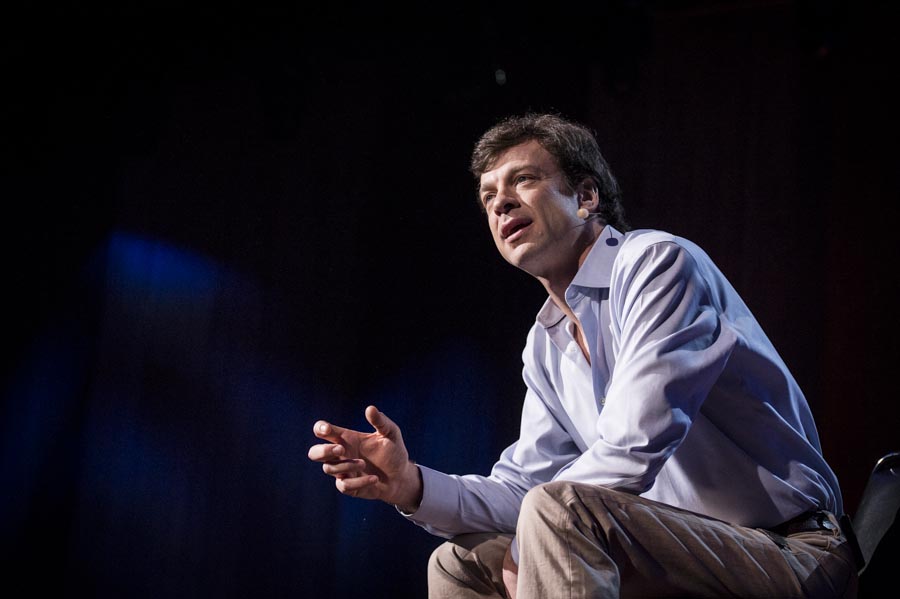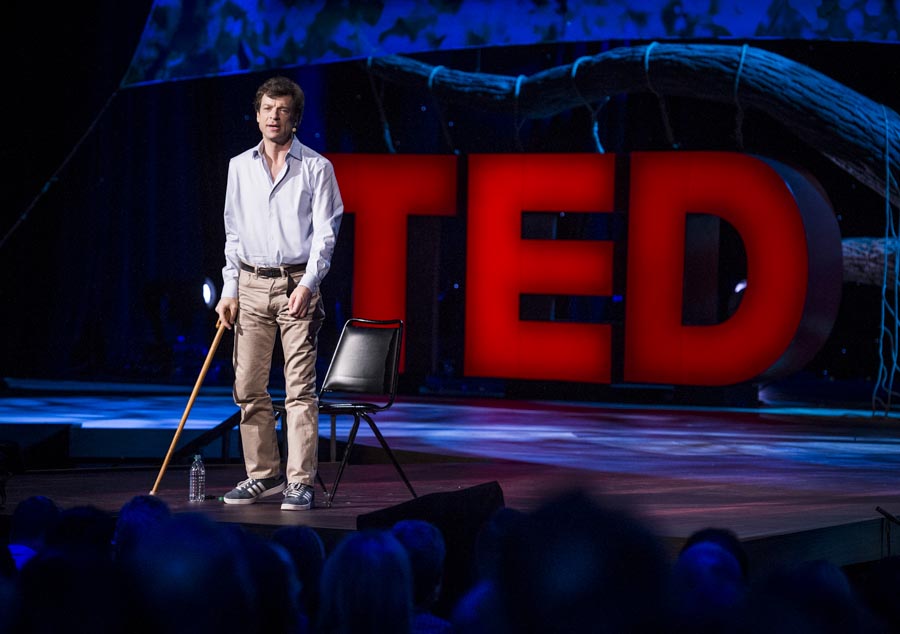When Joshua Prager was young, he dreamt he would grow up to play baseball. Or be a doctor. He never imagined that at the age of 19 he would find himself paralyzed in the hospital, and that he’d have to reteach his body to move, to relearn to breathe and speak. In his new book Half-life, Prager returns to Jerusalem, where a truck hit the bus he was riding in and broke his neck.
On stage today Prager tells the story of his return to Jerusalem and the challenge of facing the man who had so radically altered his fate: the driver of that truck. One year ago, he recalls, he set out to find this man. He didn’t have a phone number or address, but he knew his name — Abed — and the town outside Jerusalem where he lived. Twenty-one years before outside this city Prager broke his neck when he was hit by a speeding truck. Now he was off in a silver Chevy, “to find a man and some peace.”
That night 21 years ago, Prager was 19 and reveling in his newfound strength. He had just grown 5 inches and was playing basketball with his friends. He was sitting in a mini-bus off to get pizza he had won on the court when from behind there was a great bang, as loud and violent as a bomb. Prager’s head snapped back, his shoes flew off, and he flew, too.
When he landed he was a quadriplegic. Over the next few months he learned to breathe, sit and walk, and back home he was in a wheelchair for the next four years in college. After college he went back to Jerusalem. As he reflects, “I rose from my chair for good, leaned on my cane and looked back.” He contacted other victims and looked at old photographs, mourning all he had lost and not yet done and which was now impossible. On that trip Prager sought out Abed, not mentioning his condition or the fact that he knew Abed had had 27 driving violations by the age of 25. He said he wanted to meet with Abed, but later when he called back the number had been disconnected. Then, he said, “I let Abed and the crash go.”
Prager returned to New York and began his life as a journalist, typing hundreds of thousands of words with just one finger. His friend pointed out that all his stories mirrored his own: an entire life changed in one instant. His book was almost complete when he realized he still wanted to meet Abed: “I wanted to hear this man say two words: I’m sorry. People apologize for less.”
 Prager went back to Jerusalem to search for Abed. He was carrying yellow flowers as a gift when he realized how ridiculous it seemed. “But what to get a man who broke your fucking neck?” (He settled on Turkish delight.) A torrent of questions filled Prager’s mind: What would Abed say and do? Who had he become since the accident? Who was he? Was he who he was before the crash? Are all of us the result of things done to us? And done for us? As Prager says, “It seemed we could be nothing more than gene and experience.” He looked back on the road and imagined that had the accident not happened he would have been a doctor, a husband, a father. And a little less mindful of time and death.
Prager went back to Jerusalem to search for Abed. He was carrying yellow flowers as a gift when he realized how ridiculous it seemed. “But what to get a man who broke your fucking neck?” (He settled on Turkish delight.) A torrent of questions filled Prager’s mind: What would Abed say and do? Who had he become since the accident? Who was he? Was he who he was before the crash? Are all of us the result of things done to us? And done for us? As Prager says, “It seemed we could be nothing more than gene and experience.” He looked back on the road and imagined that had the accident not happened he would have been a doctor, a husband, a father. And a little less mindful of time and death.
With help from a man he met in the street, Prager arrived at Abed’s house. Abed’s wife said her husband would be home in four hours. (Her Hebrew wasn’t very good and she later confessed she thought Prager was there to install the Internet.) Abed arrived home. The two men shook hands and smiled, and Prager gave Abed his gift.
Inside Abed began his tale of woe: He had just had surgery on his eyes, he had lost his teeth in the crash. Prager knew the police report said that Abed had come away from the accident unharmed. He brought polaroids and his driver’s license to show Prager what he looked like before. But Prager didn’t want to relive the crash. As he said, “I wanted to exchange Turkish dessert for two words and be on my way. I was quiet because I had not come for truth. I had come for remorse.” He said to Abed, “I understand that the crash wasn’t your fault. But does it make you sad that others suffered?”
“Yes,” said Abed. “I suffered.”
He explained that before the crash he had lived an unholy life, and so God had ordained the crash. Now Abed was religious, and God was happy. Just then on television the news showed a crash in which three people were killed. “It is a pity the police in this country are not tough enough on bad drivers,” mused Abed. Prager was baffled. “Abed … I thought you had a few driving issues before the crash.” Abed responded, “I once went 60 in a 40.” Thus 27 violations became one. As Prager reflects, “No matter how stark the reality, a human being fits it into a narrative that is palatable.” It was that moment he realized that Abed would not apologize. He was not a particularly bad man, nor a particularly good man. He was a limited man.
“This,” Prager quotes, “is the last of the human freedoms: to choose our attitude in any human circumstance.” The aging and the anxious, the divorced and balding and bankrupt … everyone can choose to rise above bad fortune, to enjoy community, study, work, adventure, friendship, love. The good. Prager quotes Melville: “Truly to enjoy bodily warmth some small part of you must be cold.” It’s in the contrats that we find the good. Prager ends his stunning story: “You know death so you may wake each morning pulsing with life.”
Joshua Prager’s talk is now available for viewing. Watch it on TED.com»

Comments (7)
Pingback: Joshua Prager at TED2013: In search for the man who destroyed my body | TED Blog - Latestfy
Pingback: TED 2013: 9 Take-Home Themes for Me
Pingback: Joshua Prager at TED | The litter in littérateur.
Pingback: Wizmo Blog » Blog Archive » In search of the man who broke my neck: Joshua Prager at TED2013
Pingback: Wizmo Blog » Blog Archive » In search of the man who destroyed my body: Joshua Prager at TED2013